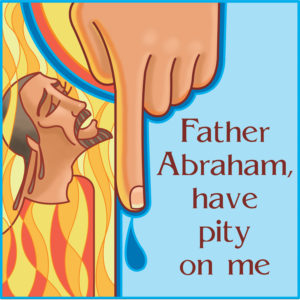Compassion or Complacency
The prophet Amos hits us square in the eye when he pulls no punches and cries out, “Thus says the Lord, the God of hosts: Woe to the complacent in Zion!” (Amos 6,1) How easy it is for us to be complacent in the face of poverty and suffering. We can shelter ourselves from the suffering of others in the world. We fabricate for ourselves a fruitless faith which insulates us from the evils of poverty and suffering in the world today. “If a brother or sister has nothing to wear and has no food for the day, and one of you says to them, “Go in peace, keep warm, and eat well, but you do not give them the necessities of the body, what good is it (your faith)?”(James 2,15) It is a great temptation for us to hide in our comfortable homes, convince ourselves that we are good people and close our eyes to what is going on in the world. We pretend that somehow it will work itself out. We can’t be bothered with someone else’s problems. The prophet Amos points out the very human tendency towards complacency that infects our societies. As Edmund Burke pointed out, “The only thing necessary for the triumph of evil is for good men to do nothing.” We become complacent in pursuing our own interests and enjoying our own pleasures and we grow blind to human suffering. Complacency allows us to convince ourselves very clearly that it is not my problem.
Complacency allows us to isolate ourselves from the suffering of humanity. We separate ourselves and create a distance between ourselves and those who are struggling with life. We withdraw more and more into our isolated existence and close ourselves off from those who fall outside of our ideal worlds. We begin to form a gulf between ourselves and the real world and this allows us to safely enjoy the goods that have been given to us. We shield ourselves from the misery of the world and convince ourselves that we are good persons and don’t deserve to be troubled with the anguish of human suffering. The divide that we create grows larger and larger until we have formed a great chasm of callousness and heartlessness. In the parable that Jesus tells the Pharisees in the gospel of Luke about a rich man and Lazarus, (Luke 16, 19-31) we hear about a great chasm that has been established between the rich man and the poor Lazarus. (Abraham said), “Moreover, between us and you a great chasm is established to prevent anyone from crossing who might wish to go from our side to yours or from your side to ours. (Luke 16,26) This rich man was not necessarily an evil person, he didn’t necessarily do bad things, he wasn’t abusive, he just didn’t care. “He who shuts his ear to the cry of the poor will himself also call and not be heard.”(Prov 21,13)

Being a good person and not causing any problems doesn’t get the rich man into heaven rather he finds himself surprisingly in hell, in a hell that he has created by his callous behavior of complacency and self-centered comfort. His separating himself from the world’s suffering has built a great chasm between himself and Lazarus, between himself and a God who has compassion on the suffering and the poor.” “See, you lowly ones, and be glad; you who see God, take heart! For the Lord hears the poor.”(Ps 69,33f) In isolating himself and separating himself from Lazarus the rich man has also separated himself from Jesus who shares the plight of the poor. “He (Jesus) will answer them, ‘Amen, I say to you, what you did not do for one of these least ones, you did not do for me.’”(Mt 25,45)
As Jesus points out in his parable, we have the prophets and the Word of God to reveal to us the true God of compassion and mercy. God, the loving Father of mercy, knows Lazarus, he knows his name and he cares about his suffering. If we want to be in eternal union with God we have to unite ourselves with the suffering servant Jesus who empties himself out of love and lays down his life to heal the wounds of sin and suffering. We have this life to come to know God through Jesus and to identify ourselves with his love, mercy and compassion. To isolate ourselves now is to face the prospect of eternal isolation in hell, separated from God by the chasm that we ourselves have built in our complacency. The suffering of others is my problem and now is the time to do something about it.




